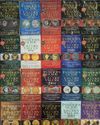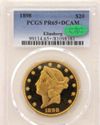Poging GOUD - Vrij
Privy Marks OF THE UNITED STATES MINT
COINage Magazine
|October - November 2025
SYMBOLS OF HISTORY THAT ADD MARKETING APPEAL

The United States Mint was first established in 1792. The U.S. Mint has experienced a reliance on ever-changing technology, as evidenced by their progression from the use of screw presses to laser engraved designs. There have been quite a few innovations over the last 233 years. But minting coins with “privy marks” on them is a practice much older than the Mint itself.
A privy mark is a small symbol, picture, letter or number that conveys a special meaning. These privy marks are typically punched into the die to be struck as part of the design of the coin.
The term “privy mark” stems from the French word privé, which was derived from the Latin word privatus, which means to be set apart or private.
Privy marks can convey a special celebration, information about the specific coin or its manufacture, or might be used to enhance a coin’s security and anti-counterfeiting properties. Unlike a mint mark, which is typically a letter or symbol used to indicate where a coin was minted, privy marks can take many different shapes and sizes.
Some of the earliest privy marks were those placed on English hammered coins during the reign of King Edward III (1327-1377). These privy marks were placed on both gold and silver coins to deter counterfeiting by both citizens and warring factions.
While many countries have used privy marks over the centuries, the Royal Canadian Mint has utilized privy marks much more often than many other countries. From privy marks depicting a maple leaf to the Titanic ship and fireworks, the Royal Canadian Mint has used many different privy marks and often marketed them as a great deterrent to counterfeiting.
Dit verhaal komt uit de October - November 2025-editie van COINage Magazine.
Abonneer u op Magzter GOLD voor toegang tot duizenden zorgvuldig samengestelde premiumverhalen en meer dan 9000 tijdschriften en kranten.
Bent u al abonnee? Aanmelden
MEER VERHALEN VAN COINage Magazine

COINage Magazine
World's Best Coin Authority Rob Oberth
Building Bridges in the World of Numismatics
2 mins
COINage Book 2026

COINage Magazine
UP, UP AND AWAY FOR RARE COINS
SPECTACULAR COINage COIN COLLECTOR'S YEARBOOK
8 mins
COINage Book 2026

COINage Magazine
GUIDE TO GRADING LINCOLN HEAD CENTS, WHEAT TYPE (1909-1958)
CAC PROVIDES PHOTOS TO GRADE YOUR COINS
4 mins
COINage Book 2026

COINage Magazine
World's Best Coin Authority Warren Mills
WARREN MILLS, named a COINage World's Greatest Coin Authority in 2025, is Vice President and Chief Numismatist of Rare Coins of New Hampshire. Mills has been a coin collector since 1965, selling multi-million dollars worth of rare coins yearly.
1 min
COINage Book 2026

COINage Magazine
World's Best Coin Authority Brett Charville
A Career Path Paved in Gold and Silver
1 mins
COINage Book 2026

COINage Magazine
World's Best Coin Authority Austin Hutto
The Rise to Top-Tier Coin Grading
1 mins
COINage Book 2026

COINage Magazine
THE INSIDER'S GUIDE To U.S. COIN VALUES
ALL THE LATEST GOLD COIN PRICES
8 mins
COINage Book 2026

COINage Magazine
World's Best Coin Authority Liz Coggan
I started my company, Elizabeth Coggan Numismatics in 2019.
1 mins
COINage Book 2026

COINage Magazine
WHY SHOULD YOU BUY GOLD & SILVER COINS & BULLION?
MINIMIZING RISK AND MAXIMIZING REWARDS
9 mins
COINage Book 2026

COINage Magazine
World's Best Coin Authority Ian Russell
GLOBALLY RECOGNIZED NUMISMATIST and veteran numismatic auctioneer Ian Russell was introduced to coins and collectibles when he was 14 years old and living in Sydney, Australia. He has graded and handled many of the greatest rarities in numismatics, including the record-breaking $12 million purchase of the world's most valuable silver coin: the unique Specimen 1794 Silver Dollar.
2 mins
COINage Book 2026
Listen
Translate
Change font size

